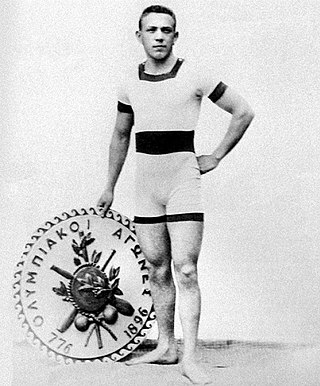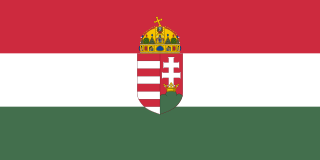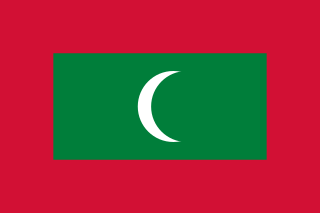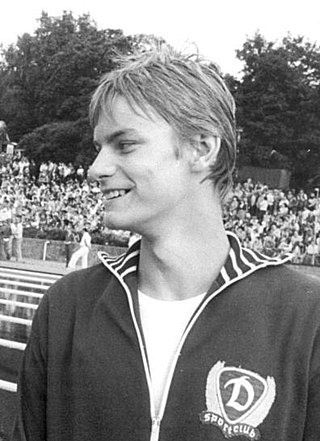
The 1896 Summer Olympics, officially known as the Games of the I Olympiad and commonly known as Athens 1896, were the first international Olympic Games held in modern history. Organised by the International Olympic Committee (IOC), which had been created by French aristocrat Pierre de Coubertin, the event was held in Athens, Greece, from 6 to 15 April 1896.
At the 1896 Summer Olympics, four swimming events were contested, all for men. They were planned and organized by the Sub-Committee for Nautical Sports. All events took place on 11 April in the Bay of Zea. There was a total of 13 participants from 4 countries competing.

Alfréd Hajós was a Hungarian swimmer, football (soccer) player, referee, manager, and career architect. He was the first modern Olympic swimming champion and the first Olympic champion of Hungary. Formerly excelling in track including discus and hurdles, he was part of the first National European football/soccer team fielded by Hungary in 1902, later serving as a referee as well as the manager and coach of the national football team.

Swimming has been a sport at every modern Summer Olympics. It has been open to women since 1912. At the Olympics, swimming has the second-highest number of medal-contested events after athletics.
At the 1908 Summer Olympics in London, six swimming events were contested. These were the first Olympic Games in which a 100-metre pool had been especially constructed. Previous Olympic events were swum in open water. Only men participated in the swimming events. The competitions were held from Monday, July 13, 1908, to Saturday, July 25, 1908.

Hungary competed at the 1896 Summer Olympics in Athens, Greece. Austrian and Hungarian results at early Olympic Games are generally kept separate despite the union of the two nations as Austria-Hungary at the time.

Paul Neumann was an Austrian swimmer and physician, who competed at the 1896 Summer Olympics in Athens and became the first ever Austrian gold medalist.

Dr. Otto Herschmann was an Austrian Jewish swimmer, fencer, lawyer, and sports official. He is one of only a few athletes who have won Olympic medals in multiple sports, having received a silver medal in swimming in 1896 and a silver medal in fencing in 1912. He also worked as a lawyer, and served as president of the Austrian Olympic Committee and the Austrian Swimming Federation. Herschmann was murdered by the Nazis in 1942 during The Holocaust.
Efstathios Chorafas or Khorafas was a Greek swimmer. He competed at the 1896 Summer Olympics in Athens.

The men's 500 metre freestyle was one of the four swimming events on the Swimming at the 1896 Summer Olympics programme.

The men's 1200 metre freestyle was one of the four swimming events on the Swimming at the 1896 Summer Olympics programme.

The men's sailors 100 metre freestyle was one of the four swimming events on the Swimming at the 1896 Summer Olympics programme. The second swimming race was open only to sailors of the Greek Royal Navy. Eleven entered but only three actually took part in the event. The winning time was nearly a minute slower than that of the open 100 metre freestyle.

The men's 100 metre freestyle was one of six swimming events on the swimming at the 1908 Summer Olympics programme. It was the shortest of the three individual freestyle events, as the 50 yard freestyle had been dropped after its one appearance on the 1904 Summer Olympics programme. The 100 metre event was contested for the third time after it had been held at the 1896 and 1906 Olympics. The 1904 Olympics saw a 100-yard event. The competition was held on Friday 17 July 1908 and Monday 20 July 1908. Thirty-four swimmers from twelve nations competed. Each nation was limited to 12 swimmers.

The men's 100 yard freestyle was a swimming event held as part of the Swimming at the 1904 Summer Olympics programme. It was the second time the event was held at the Olympics, though the only time yards were used instead of metres. 9 swimmers from 2 nations competed. The event was won by Zoltán Halmay of Hungary, the nation's second consecutive victory in the 100 yard/metre freestyle.

The Maldives first participated at the Olympic Games in 1988. It has sent athletes to compete in every Summer Olympic Games since, but has not participated in the Winter Olympic Games.

The men's 100 metre freestyle event at the 1980 Summer Olympics was held on 26 and 27 July at the Swimming Pool at the Olimpiysky Sports Complex. There were 39 competitors from 26 nations. Nations had been limited to three swimmers each since the 1924 Games. The event was won by Jörg Woithe of East Germany, the nation's first medal in the men's 100 metre freestyle. Sweden earned its first medals in the event since 1952 with Per Holmertz's silver and Per Johansson's bronze.

The men's 100 metre freestyle event at the 1948 Olympic Games took place between 30 and 31 July at the Empire Pool. There were 41 competitors from 19 nations. Nations had been limited to three swimmers each since the 1924 Games. The event was won by Wally Ris, returning the United States to the podium in the event after a one-Games absence broke a seven-Games streak. It was the sixth victory for an American in the 100 metre freestyle, most of any nation. Another American, Alan Ford, took silver. Géza Kádas of Hungary earned bronze, the nation's third medal in four Games. Japan's three-Games medal streak in the event ended with no Japanese swimmers competing due to the nation not being invited after World War II.

The men's 100 metre freestyle event at the 1952 Summer Olympics took place between 26 and 27 July at the Helsinki Swimming Stadium. There were 61 competitors from 33 nations. Nations had been limited to three swimmers each since the 1924 Games. The event was won by Clarke Scholes of the United States, the nation's second consecutive and seventh overall victory in the men's 100 metre freestyle. Japan, absent from the 1948 Games after World War II, returned to the podium in the event with Hiroshi Suzuki's silver. Göran Larsson earned Sweden's first medal in the event since 1908 with his bronze.

The men's 100 metre freestyle event at the 1968 Olympic Games took place between 18 and 19 October. There were 64 competitors from 34 nations. Nations had been limited to three swimmers each since the 1924 Games. The event was won by Michael Wenden of Australia, the nation's third victory in four Games. Americans Ken Walsh and Mark Spitz took silver and bronze, respectively.

The Refugee Olympic Team competed at the 2016 Summer Olympics in Rio de Janeiro, Brazil, from 5 to 21 August 2016, as independent Olympic participants.
















